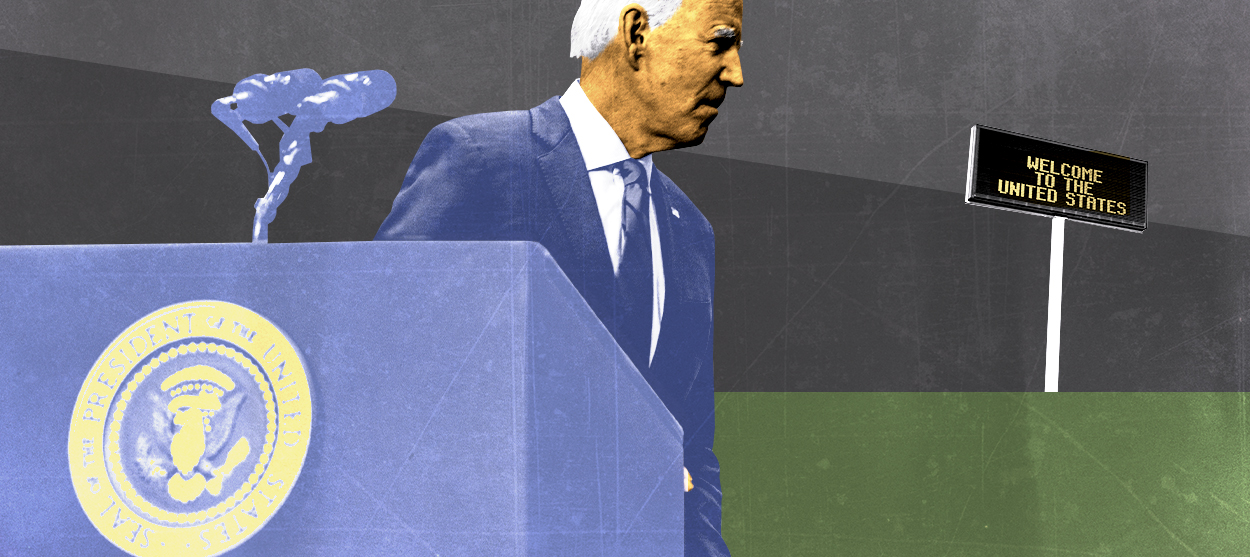How Biden's immigration bill would empower future Trumps
There's a lot to like about the bill — but the elements pertaining to guest worker programs have major problems


A free daily email with the biggest news stories of the day – and the best features from TheWeek.com
You are now subscribed
Your newsletter sign-up was successful
President Joe Biden has undone some of his predecessor's malevolent immigration legacy with executive authority. But accomplishing the rest of his immigration agenda will require legislative action, which is why he has worked with congressional Democrats to craft the U.S. Citizenship Act of 2021. There is much to like in the bill, which was unveiled in February and is being pushed in Congress. However, thanks to labor pressures, there are some unfortunate elements pertaining to guest worker programs for both low and high-skilled immigration that will sow the seeds for mischief by future Trumps.
Biden needs to rethink them pronto.
Within his first few days in office, Biden used executive means to scrap some of Trump's worst anti-immigration actions. He ended the "Muslim" travel ban, reinstated the DACA program that shielded DREAMers (those who have grown up in America after they were brought here without proper authorization as minors) from deportation, and revived the refugee program that Trump all but gutted. Then, last week, he lifted Trump's COVID-related ban on immigrant visas for the foreign spouses and children of Americans, the other child separation policy that few had heard about.
The Week
Escape your echo chamber. Get the facts behind the news, plus analysis from multiple perspectives.

Sign up for The Week's Free Newsletters
From our morning news briefing to a weekly Good News Newsletter, get the best of The Week delivered directly to your inbox.
From our morning news briefing to a weekly Good News Newsletter, get the best of The Week delivered directly to your inbox.
But Biden can't use his executive authority to permanently legalize the undocumented population or make other fundamental reforms, which is where the U.S. Citizenship Act comes in. Sponsored by Sen. Bob Menendez (D-N.J.) and Rep. Linda Sánchez (D-Calif.), this legislation would open a clean eight-year-path to citizenship for the vast majority of the 11 million undocumented migrants in the U.S., without the enforcement poison pills that restrictionists had managed to stuff in previous efforts by Presidents Barack Obama and George W. Bush. There is no wall funding or enhanced detentions and deportations or increased border patrolling. To the contrary, the bill would allow agricultural workers who've clocked 2,300 work hours in the country to apply for green cards, just like high-skilled immigrants can do today.
And Biden's bill doesn't ignore the problems that high-skilled immigrants face either. It proposes a series of steps to expedite the process they go through to obtain a green card, which grants permanent residency. It would:
- Raise the annual number of employment-based green cards from 140,000 to 170,000 for them.
- Recapture some 220,000 green cards left over from countries that have not used their annual quota over the past decades and make them available to high-demand countries like India whose nationals are experiencing a 100-year backlog.
- Count the green cards received by the family members of foreign professionals as one application — not separate ones — instantly doubling the annual number of employment-based green cards available. This too would go a long way toward easing the horrendous green card wait times that some nationalities are facing.
- Make F-1 student visas "dual intent" so that their holders are no longer barred from applying for green cards.
- Exempt international STEM students with a Ph.D. from a U.S. university from the numeric limit on green cards.
This is all great stuff. So what's the problem? Namely that the administration is primarily helping immigrants stuck in America's broken immigration system, not fundamentally fixing the system to ease future flows. Indeed, the bill as written will set the country up for yet another immigration war, just as happened after President Ronald Reagan's immigration reforms.
Reagan handed amnesty to undocumented workers without offering more legal avenues for future low-skilled immigrants, causing the undocumented population to soar again. This allowed the nativist opponents of Reagan's amnesty in his own party to declare his reforms a failure and demand ever more border enforcement. Biden is making the same mistake — and compounding it.
A free daily email with the biggest news stories of the day – and the best features from TheWeek.com
He does nothing to reform, much less expand, the H-2A visa program used by agriculture workers or the H-2B program used by workers in hospitality, landscaping, construction and other similar industries. Unlike green cards, these visas are temporary — not to mention expensive and bureaucratic. But the H-2B program also has a tight 66,000 annual cap. A new, usable, year-round guest worker visa program that has a generous — or preferably, no — cap and is available to all industries is key to fixing the undocumented problem forever. This is not an extreme idea. Back in 2011 when President Obama proposed his immigration reforms, conservatives were suggesting far more radical ideas — including authorizing private agencies to process unlimited and renewable guest worker visas in Mexico for jobs in America.
But instead of doing that, Biden is proposing to scrap the exemption that farmers enjoy from paying overtime to H-2A workers. The combination of no additional legal avenues and greater pay for legal hires will only increase the incentive for illegal hires. This is especially true given that once the current workforce at farms and elsewhere is granted amnesty, it will move on to more lucrative industries, making the agricultural labor market even tighter.
But if Biden's bill does little to help prospective low-skilled migrants, it actually borrows a few pages from Trump's book to slam future high-skilled workers.
Trump tried to make the H-1B visa program allegedly less injurious to native workers by issuing regulations that prioritized higher salaried applicants rather than maintaining the present lottery system. The current 85,000 annual cap on H-1Bs is so low that these visas run out within weeks of becoming available.
The net effect of Trump's salary-based method of handling H-1Bs would have been to make H-1Bs completely unavailable to small operations and start-ups that rely on young talent.
But instead of rejecting this ridiculous proposal, Biden's bill would actually seal it into law, walling off small employers from one of the very few legal avenues they have to meet their technical labor needs.
It gets worse.
Trump used his emergency authority to bar all new foreign professionals from the country during the pandemic on the pretext of protecting native workers from competition at a time of high unemployment. It's an open secret that labor unions loved this provision. So Biden is trying to appease them too by giving the Department of Homeland Secretary the statutory power to "temporarily" diminish the number of employment-based visas handed out during periods of "high unemployment" (but not upwards at a time of low unemployment). Not only is this redundant given that foreign professionals already have to obtain labor certification testifying that there are no qualified Americans to do their job to obtain such visas, it is also dangerous. Why? Because the bill defines neither "temporary" nor "high unemployment." This means that future Steven Millers who want to follow in the footsteps of Trump's white nationalist immigration czar could legally bar all foreign professionals for years on end without having to even worry about a credible court challenge.
If immigration reform is going to be Biden's legacy, he should do everything to get it right. His bill is going to face very strong opposition from restrictionists in Congress so it would be understandable if he remained open to compromise. He can’t, after all, let the perfect become the enemy of the good. But he also shouldn't make unforced errors that break the immigration system even further.
Shikha Dalmia is a visiting fellow at the Mercatus Center at George Mason University studying the rise of populist authoritarianism. She is a Bloomberg View contributor and a columnist at the Washington Examiner, and she also writes regularly for The New York Times, USA Today, The Wall Street Journal, and numerous other publications. She considers herself to be a progressive libertarian and an agnostic with Buddhist longings and a Sufi soul.
-
 ‘Those rights don’t exist to protect criminals’
‘Those rights don’t exist to protect criminals’Instant Opinion Opinion, comment and editorials of the day
-
 Key Bangladesh election returns old guard to power
Key Bangladesh election returns old guard to powerSpeed Read The Bangladesh Nationalist Party claimed a decisive victory
-
 Judge blocks Hegseth from punishing Kelly over video
Judge blocks Hegseth from punishing Kelly over videoSpeed Read Defense Secretary Pete Hegseth pushed for the senator to be demoted over a video in which he reminds military officials they should refuse illegal orders
-
 How did ‘wine moms’ become the face of anti-ICE protests?
How did ‘wine moms’ become the face of anti-ICE protests?Today’s Big Question Women lead the resistance to Trump’s deportations
-
 The UK expands its Hong Kong visa scheme
The UK expands its Hong Kong visa schemeThe Explainer Around 26,000 additional arrivals expected in the UK as government widens eligibility in response to crackdown on rights in former colony
-
 How are Democrats trying to reform ICE?
How are Democrats trying to reform ICE?Today’s Big Question Democratic leadership has put forth several demands for the agency
-
 Minnesota’s legal system buckles under Trump’s ICE surge
Minnesota’s legal system buckles under Trump’s ICE surgeIN THE SPOTLIGHT Mass arrests and chaotic administration have pushed Twin Cities courts to the brink as lawyers and judges alike struggle to keep pace with ICE’s activity
-
 700 ICE agents exit Twin Cities amid legal chaos
700 ICE agents exit Twin Cities amid legal chaosSpeed Read More than 2,000 agents remain in the region
-
 House ends brief shutdown, tees up ICE showdown
House ends brief shutdown, tees up ICE showdownSpeed Read Numerous Democrats joined most Republicans in voting yes
-
 Judge slams ICE violations amid growing backlash
Judge slams ICE violations amid growing backlashSpeed Read ‘ICE is not a law unto itself,’ said a federal judge after the agency violated at least 96 court orders
-
 Businesses are caught in the middle of ICE activities
Businesses are caught in the middle of ICE activitiesIn the Spotlight Many companies are being forced to choose a side in the ICE debate
